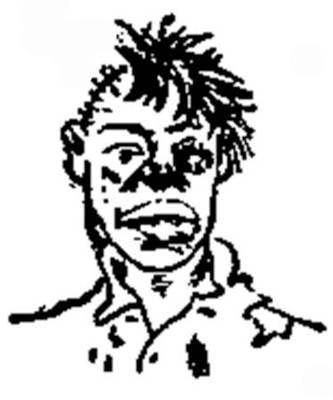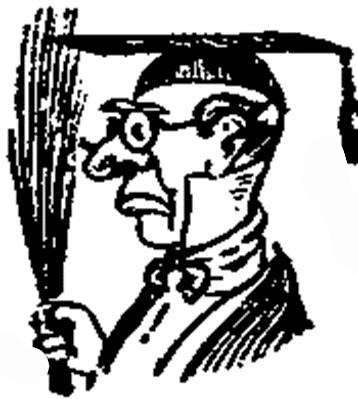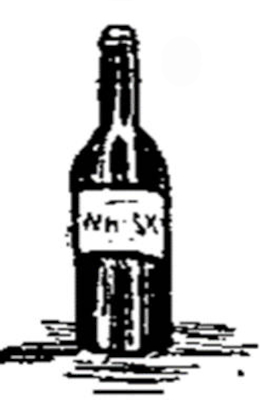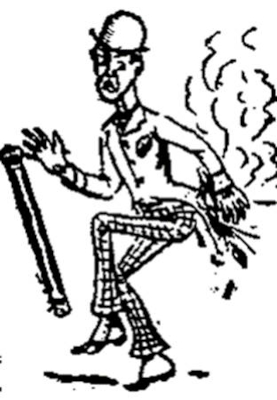This article has been transcribed from a copy of the Cardiff Times in the online collection of scanned Welsh newspapers 1804-1919 in the National Library of Wales, with grateful recognition of the free access accorded to all readers. Paragraph breaks have been introduced for easier reading.
Samuel confirms that he lives in Yorkshire. His use of regional words and phrases, as well as some direct references to his location, narrows this down to the West Riding, and specifically Bradford or Leeds. He refers to a local notable, John Thomas North, 1842-1896, ‘The Nitrate King,’ a mechanic from Leeds who became exceedingly rich from a nitrate company in the Atacama Desert in Chile, and who is still reviled for his dire effects in that region. Given the racial prejudice of the time, the exclamation mark probably does not convey disapproval of this racial term, but suggests instead that blacked-up minstrels were not funny. —David Skilton

F a truth, sir, life is made up of regrets. Few amongst us are there, ‘especially in the dread [dead], unhappy night, and when the rain is on the roof,’ [Tennyson ‘Locksley Hall’] who do not dismally reflect on past mistakes and sins of omission or commission, and on the things that ‘might have been – that long, melancholy, and spectral list. Some men in indulging in their regrets go right back to the beginning and regret that they ever were born. I am not one of that sort, sir, at all – the only thing that I regret about my birth is that I was not born as the eldest son of my father and with the proverbial silver spoon in my mouth. However, even in this regret, as in many others, I have at least the satisfaction of knowing that I myself was I not to blame in the matter; I was simply the slave of circumstances. Though I do not, as I say, regret the very first act of my career, I certainly regret certain circumstances which occurred not long subsequently. For instance, I regret experimenting with the wringing machine, and most successfully attempting to wring out my left thumb. I regret that I ever hurled defiance in the school-yard at one ‘Joe Harry’ Nawper, a boy of very ample proportions, who asserted that I had disparagingly referred to him as ‘tin-ribs.’ ‘Joe Harry’ and I came to blows – that is to say, I came to all the blows, or all the blows came to me. I certainly do know that ever since that date I have been gifted with a patent bridgeless, flexible nose, with which even a high wind can blow on one side – a nose with which, were it only a little longer, I could scratch the back of my bead, so ‘hingy’ and pliable is it.

‘Very dilapidated after an interview with ‘Ahr Joe Harry.’
. I go so far as to greatly regret my father's choice of a school for my due training in the way I should go. I regretted it even more at the time that I first went than I do now, for I can at least sit down with ease and comfort nowadays, a thing that was often quite out of the question whilst I was still at school. McStinger – ‘The Rev John, M.A.’ as he was doubtless described in Crockford's Clerical Directory – was often referred to by my contemporaries as a ‘waxy’ man; I myself should be more inclined to regard him as a ‘Whackey’ one. I regret that he should have chosen to plant – ash-plant so much learning in me, but doubtless he acted out of pure caned-ness of heart – kindness of heart, I mean; what am I talking about?

‘The Rev John McStinger, M.A.’
I regret my choice of a career, sir. My original intention (a rather common one, I believe) as a boy was to be a soldier, and I don't know whether it was not a wise one. Soldiers haven't over much to do as a rule, their ‘grub’ is certain, they have lots of chances with the ladies (if their taste be not of too elevated a kind), and they have always a chance of promotion if they only elect to keep decently sober as a general thing. I almost regret that I was not a soldier; I should certainly always have been in time of war where the powder and shot are the thickest – hidden in an ammunition waggon – and I am confident that I was made for a soldier, I have such a tremendous thirst on me at times. I rather regret that I joined the literary rank and file – a good deal mere file than rank about most of them; in fact, too only thing suggesting rank about a good many of them that I know of is their tobacco-smelling clothes. I regret becoming a literary man because of the constant strain on such an individual, and the cold, callous, calculating, cruel, criminal, cross, non-appreciating editors – but I'll say no more on that head.

‘A man with a message from Her Gracious Majesty [delivering a summons] – a man whom regret ever having met.’
Amongst all my regrets, sir, I never regret having married – but I certainly regret that whilst I was about it I didn't marry a ‘bit o' brass,’ as a familiar phrase in this part of the country has it. I would never, sir, have been so mercenary as to marry for money, but I certainly think that with a little honest effort on my part, I could have liked a girl with a thousand a year or so as well as one who hadn't, other things being equal. More even than this do I regret that I backed my brother-in-law's bills; that I travelled in the same carriage with a man who had had small-pox; that l once wrote a play; that I sewed up the sleeves of a crusty but rich uncle's nightgown, and mortally offended him as a consequence; that I proposed marriage to Miss Peglegs, of the corps de ballet, and had to ‘square’ her [pay her off]; that I started a newspaper before studying the law of libel; that I used to lend half sovereigns to actors;

‘Have you ever regretted carriyng fusees in your tail pockets?
that I went into a state of exhilaration to a temperance banquet and lost a berth worth £500 a year; that I imagined that I could make a fortune by backing horses; that I essayed football playing; that I undertook to ‘tak in’ an Encyclopædia in five hundred shilling parts; that I borrowed twenty pounds from a money lender; that I quarrelled with the parson of the parish, who referred to me at a public meeting assembled as a ‘meddlesome heathen;’ that I brought an action at law against him; that – well, what need is there for me to go on with – such a catalogue? I am the prey to heaps of regrets, chief amongst which are regrets that I am not earning as much as a ‘Nitrate" King,’ a parachutist, or a ‘comic’ (!) nigger [see headnote] of the ‘star’ order. I suppose, sir, that even in regrets there is some compensating influence.
’Perhaps they spur one on to exertions, perhaps they incline one to walk so straight in the present that the future shall bring to one’s share as few of them as possible.
Last modified 26 February 2022